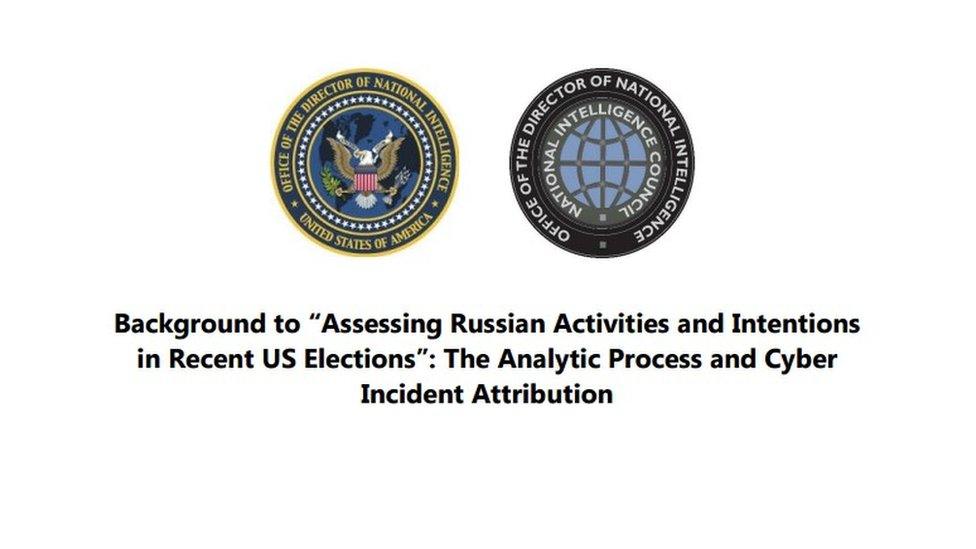US report on Russian election campaign hacking: Key points
- Published

Key findings from the US intelligence report, external analysing Russia's role in the 2016 presidential election.
Putin's involvement
"We assess with high confidence that Russian President Vladimir Putin ordered an influence campaign in 2016 aimed at the US presidential election, the consistent goals of which were to undermine public faith in the US democratic process, denigrate Secretary [Hillary] Clinton, and harm her electability and potential presidency."
Preference for Trump against Clinton
"We also assess Putin and the Russian government aspired to help President-elect Trump's election chances when possible by discrediting Secretary Clinton and publicly contrasting her unfavourably to him. All three agencies agree with this judgment. CIA and FBI have high confidence in this judgment; NSA [National Security Agency] has moderate confidence."
Why did Russia like Trump?
"Putin publicly indicated a preference for President-elect Trump's stated policy to work with Russia, and pro-Kremlin figures spoke highly about what they saw as his Russia-friendly positions on Syria and Ukraine. Putin publicly contrasted the President-elect's approach to Russia with Secretary Clinton's "aggressive rhetoric.
"Moscow also saw the election of President-elect Trump as a way to achieve an international counter-terrorism coalition against the Islamic State in Iraq and the Levant [ISIL/IS/ISIS].
"Putin has had many positive experiences working with Western political leaders whose business interests made them more disposed to deal with Russia, such as former Italian Prime Minister Silvio Berlusconi and former German Chancellor Gerhard Schroeder."
Undermine Clinton
"When it appeared to Moscow that Secretary Clinton was likely to win the election, the Russian influence campaign began to focus more on undermining her future presidency."
Why did Putin not like Clinton?
"Putin most likely wanted to discredit Secretary Clinton because he has publicly blamed her since 2011 for inciting mass protests against his regime in late 2011 and early 2012, and because he holds a grudge for comments he almost certainly saw as disparaging him."
Impact on vote
"Russian intelligence obtained and maintained access to elements of multiple US state or local electoral boards.
"DHS [Department of Homeland Security] assesses that the types of systems we observed Russian actors targeting or compromising are not involved in vote tallying."
Kremlin behind everything
"We assess that influence campaigns are approved at the highest levels of the Russian government - particularly those that would be politically sensitive."
Proxies implement Kremlin directions
"The General Staff Main Intelligence Directorate [GRU - military intelligence] probably began cyber operations aimed at the US election by March 2016. We assess that the GRU operations resulted in the compromise of the personal email accounts of Democratic Party officials and political figures. By May, the GRU had exfiltrated large volumes of data from the DNC.
"We assess with high confidence that the GRU used the Guccifer 2.0 persona, DCLeaks.com, and WikiLeaks to release US victim data obtained in cyber operations publicly and in exclusives to media outlets."
Republicans targeted, too
"Russia collected on some Republican-affiliated targets but did not conduct a comparable disclosure campaign."
Bold influence is 'new normal'
"Russia's effort to influence the 2016 US presidential election represented a significant escalation in directness, level of activity, and scope of effort compared to previous operations aimed at US elections.
"We assess Moscow will apply lessons learned from its campaign aimed at the US presidential election to future influence efforts in the United States and worldwide, including against US allies and their election processes.
"We assess the Russian intelligence services would have seen their election influence campaign as at least a qualified success because of their perceived ability to impact public discussion."